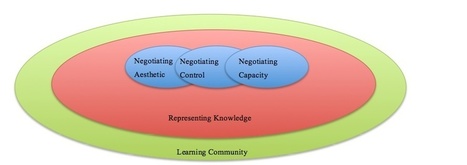Introduction . In a connected world youth are participating in digital content creating communities. This paper introduces a description of teens' information practices in digital content creating and sharing communities.
Method. The research design was a constructivist grounded theory methodology. Seventeen interviews with eleven teens were collected and observation of their digital communities occurred over a two-year period.
Analysis. The data were analysed iteratively to describe teens' interactions with information through open and then focused coding. Emergent categories were shared with participants to confirm conceptual categories. Focused coding provided connections between conceptual categories resulting in the theory, which was also shared with participants for feedback.
Results. The paper posits a substantive theory of teens' information practices as they create and share content. It highlights that teens engage in the information actions of accessing, evaluating, and using information. They experienced information in five ways: participation, information, collaboration, process, and artefact. The intersection of enacting information actions and experiences of information resulted in five information practices: learning community, negotiating aesthetic, negotiating control, negotiating capacity, and representing knowledge. Conclusion. This study contributes to our understanding of youth information actions, experiences, and practices. Further research into these communities might indicate what information practices are foundational to digital communities.
 Your new post is loading...
Your new post is loading...
 Your new post is loading...
Your new post is loading...











